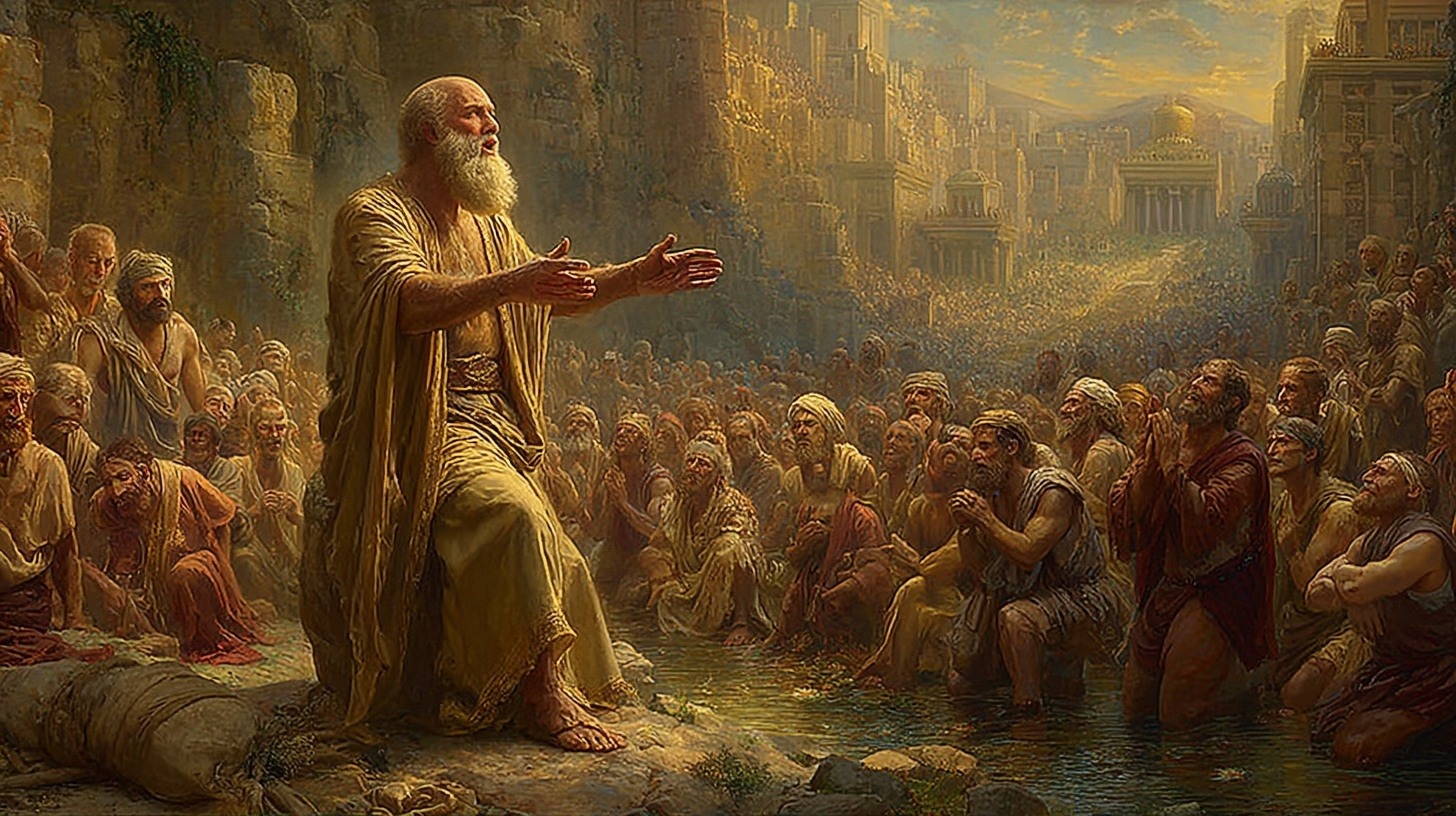
The Book of Jonah 3 reveals God’s persistent grace through a second chance for His reluctant prophet. When Jonah finally obeys and delivers God’s warning to Nineveh, the entire Assyrian capital experiences miraculous repentance. This chapter demonstrates that God’s mercy extends beyond our prejudices, offering redemption to all who genuinely turn from evil and seek His forgiveness.
Table of Contents
The story of Jonah stands as one of Scripture’s most powerful testimonies about second chances, divine mercy, and the struggle between human prejudice and God’s universal love. When we reach the Book of Jonah 3, we encounter a prophet who has learned obedience the hard way and a pagan city that responds to God’s message with stunning humility. This chapter reveals profound truths about repentance, God’s relentless pursuit of the lost, and His willingness to extend mercy even to those we might consider undeserving.
For contemporary believers navigating a divided world, Jonah’s account speaks directly to issues of racial reconciliation, political tensions, and our tendency to withhold grace from those we view as enemies. Through the study of biblical wisdom for faithful living, we discover that God’s economy of grace operates far beyond our comfortable boundaries.
God’s Second Call to Jonah
God gives Jonah a second opportunity to fulfill his prophetic mission to Nineveh. This divine persistence demonstrates that God does not abandon His purposes or His servants, even after significant failure. Jonah’s obedience after his ordeal in the fish shows the transformative power of God’s discipline and the possibility of redemption following rebellion.
Now the word of the Lord came to Jonah the second time, saying, “Arise, go to Nineveh, that great city, and preach to it the message that I tell you.” So Jonah arose and went to Nineveh, according to the word of the Lord. (Jonah 3:1-3 NKJV)
The phrase “the second time” carries enormous weight in the narrative of the Book of Jonah 3. After Jonah’s dramatic flight from God’s presence, his near-death experience at sea, and his three days inside the great fish (as detailed in our study of Jonah’s initial disobedience and running from God), God could have chosen a different messenger. Instead, the Lord demonstrates His commitment both to His purposes and to His chosen servant by offering Jonah another opportunity.
This second calling occurs after Jonah has returned to Jerusalem. According to the teaching found in our verse-by-verse Bible Messages series, Jonah likely presented a startling appearance when he arrived back in the holy city. His body would have borne the marks of his ordeal including possible tooth marks from the fish, discolored skin from digestive acids, and potentially complete hair loss. He became a walking testimony to God’s power and mercy, a living sign that would later validate his message in Nineveh.
The simplicity of God’s message remains unchanged: “Arise, go to Nineveh, that great city, and preach to it the message that I tell you.” God does not complicate the assignment or add conditions. He simply restates His original commission. This directness reveals an important principle about divine calling—God’s purposes do not change based on our initial responses. When we explore the consistent patterns of scriptural truth for contemporary living, we find that God remains faithful to His mission even when we fail in our obedience.
Jonah’s response this time stands in stark contrast to his earlier flight. “So Jonah arose and went to Nineveh, according to the word of the Lord.” The text provides no commentary about Jonah’s internal state, no indication of enthusiasm or joy. He simply obeys. Sometimes mature faith looks less like passionate excitement and more like determined compliance with God’s revealed will, even when our hearts have not fully caught up with our actions.
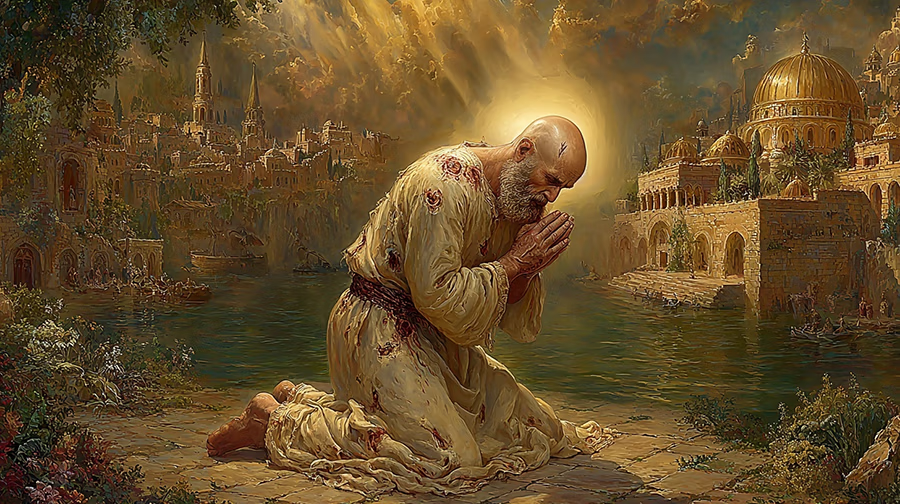
The Magnitude of Nineveh
Nineveh was an exceedingly great city, approximately the size of modern New York City, requiring three days to walk around its circumference. With a population of about 600,000 people, it represented the largest and most powerful urban center of the ancient world, making Jonah’s mission both daunting and strategically significant.
Now Nineveh was an exceedingly great city, a three-day journey in extent. (Jonah 3:3 NKJV)
The text emphasizes Nineveh’s extraordinary size using Hebrew superlatives that indicate divine perspective. The phrase “exceedingly great city” literally means “a great city to God,” suggesting that God had particular interest in this metropolis despite its wickedness. Nineveh’s 80-mile circumference made it the ancient world’s largest urban center, a sprawling capital that housed the seat of Assyrian power.
Understanding Nineveh’s significance helps us grasp the audacity of God’s mission for Jonah. The Assyrians were known throughout the ancient Near East for their brutal military tactics. They practiced systematic torture, skinned captives alive, and displayed the bodies of their enemies as warnings. Their cruelty was not merely a byproduct of war but a deliberate policy designed to terrorize conquered peoples into submission. For an Israelite prophet to enter this city and pronounce judgment required either great faith or complete resignation to God’s will.
The three-day journey around Nineveh’s perimeter becomes significant in the narrative structure. Jonah begins entering the city and walks for one full day without speaking. This silent procession through the streets of Nineveh served a crucial purpose. The people needed to see him before they heard his message. His physical appearance, marked by his ordeal in the fish, would have been unmistakable and shocking. The Ninevites worshiped Dagon, the fish god, and stories of a man swallowed by a great fish, preserved for three days, and then expelled onto the shore would have reached their ears through maritime trade routes.
As we consider perspectives on faith and culture today, Nineveh represents the places and people we consider unreachable or unworthy of God’s grace. Every generation has its “Nineveh” where believers struggle to extend the offer of repentance and reconciliation.
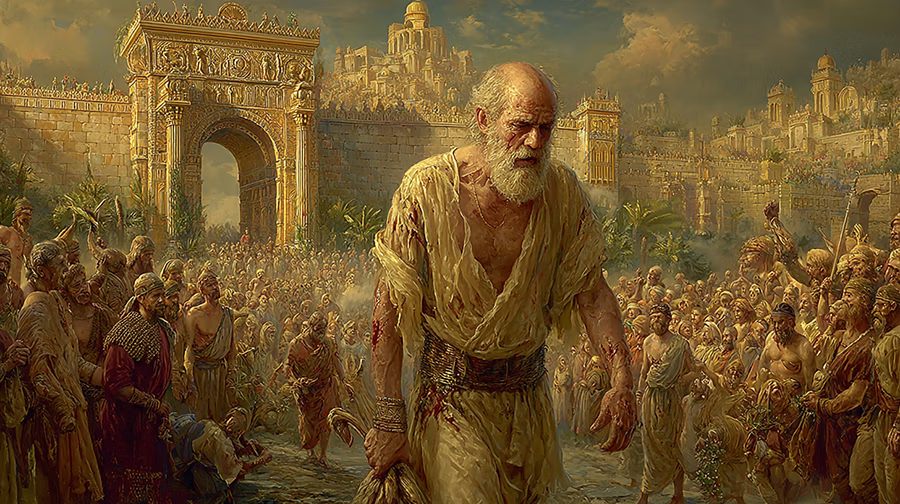
Jonah’s Preaching and Nineveh’s Response
Jonah delivers a simple eight-word message in Hebrew declaring Nineveh’s destruction in forty days. Remarkably, the entire city responds with immediate and comprehensive repentance. This mass turning to God demonstrates the power of authentic prophetic witness and the Holy Spirit’s conviction working in receptive hearts prepared by divine providence.
And Jonah began to enter the city on the first day’s walk. Then he cried out and said, “Yet forty days, and Nineveh shall be overthrown!” (Jonah 3:4 NKJV)
After his day-long silent walk through Nineveh’s streets, Jonah finally delivers his message. The Hebrew text contains only five words (eight in English), making this one of the shortest prophetic utterances in Scripture. No elaborate explanation, no call to repentance, no promise of mercy accompanies the warning. Simply: “Yet forty days, and Nineveh shall be overthrown.”
The stark simplicity of the message highlights several truths about God’s communication. First, divine judgment does not require extensive justification. The Ninevites knew their own wickedness. Second, God’s warnings contain implicit opportunities for response. Though Jonah does not explicitly call for repentance, the forty-day timeframe creates space for changed hearts and altered trajectories. Third, the power of God’s word does not depend on eloquent delivery or persuasive rhetoric.
So the people of Nineveh believed God, proclaimed a fast, and put on sackcloth, from the greatest to the least of them. (Jonah 3:5 NKJV)
The response proves absolutely stunning. The entire population, “from the greatest to the least,” immediately believes God’s message and initiates acts of repentance. They did not merely believe Jonah or believe in the possibility of destruction. They “believed God” implying personal faith in the deity behind the message.
Their choice to don sackcloth and proclaim a fast reveals familiarity with Israelite penitential practices. How did they know these customs? Trade relations, captured Israelites, or perhaps even divine revelation could explain their knowledge. What matters most is their willingness to humble themselves completely before a God they previously did not worship. This mass conversion demonstrates the Holy Spirit’s convicting work and validates the principle that God draws people to Himself through means we cannot always predict or understand.
For believers today who struggle with evangelistic efforts in hostile environments, Nineveh’s response offers both encouragement and challenge. The encouragement comes from knowing that God can soften the hardest hearts. The challenge lies in our willingness to deliver His message without prejudging the outcome or withholding the invitation based on our biases. When we examine principles from our study of faithful Christian character, we discover that obedience to God’s commission must supersede our personal preferences about who deserves to hear the gospel.
The King’s Decree and National Repentance
The king of Nineveh responds to Jonah’s warning by rising from his throne, removing his royal robes, covering himself in sackcloth, and sitting in ashes. He then issues a decree commanding all people and even animals to fast, wear sackcloth, and cry out to God, demonstrating unprecedented humility and genuine repentance at the highest level of Assyrian society.
Then word came to the king of Nineveh; and he arose from his throne and laid aside his robe, covered himself with sackcloth and sat in ashes. And he caused it to be proclaimed and published throughout Nineveh by the decree of the king and his nobles, saying: Let neither man nor beast, herd nor flock, taste anything; do not let them eat, or drink water. (Jonah 3:6-7 NKJV)
Historical records identify this king as Ashur-dan III, who ruled Assyria during a period marked by military setbacks, plagues, and a solar eclipse—all events the Assyrians would have interpreted as divine displeasure. Archaeological evidence from Nineveh’s ruins confirms the existence of this palace and provides insight into the grandeur from which the king descended in his act of humility.
The king’s response models genuine repentance from leadership. He does not delegate the crisis to advisors or attempt to negotiate with God through intermediaries. Instead, he personally leads by example, stripping away the symbols of his power and authority to identify completely with his subjects in their need for divine mercy. His actions recall similar moments in Scripture where leaders recognized that their position did not exempt them from accountability to the Almighty.

The decree itself extends to unprecedented lengths:
But let man and beast be covered with sackcloth, and cry mightily to God; yes, let every one turn from his evil way and from the violence that is in his hands. (Jonah 3:8 NKJV)
The inclusion of animals in the fast and sackcloth may seem strange to modern readers, but it served multiple purposes. First, it intensified the atmosphere of urgent crisis. Anyone who has heard cattle lowing at feeding time knows the volume and persistence of their cries. Multiplied across the entire city, the sound of distressed animals would have created an unrelenting reminder of their desperate situation. Second, it demonstrated the comprehensiveness of their repentance, extending to every living thing within their gates. Third, it acknowledged that human sin affects all creation—a principle echoed in Romans 8:22 where Paul writes that the whole creation groans together.
The king’s exhortation to turn from “evil ways” and “violence” identifies the core issues of Assyrian culture. These were not people repenting of minor infractions but of systematic cruelty and injustice. The call to turn from “the violence that is in his hands” uses vivid imagery—violence pictured as something grasped, wielded, and actively practiced. True repentance requires releasing what we have held tightly, even when that thing has defined our identity or provided our sense of power.
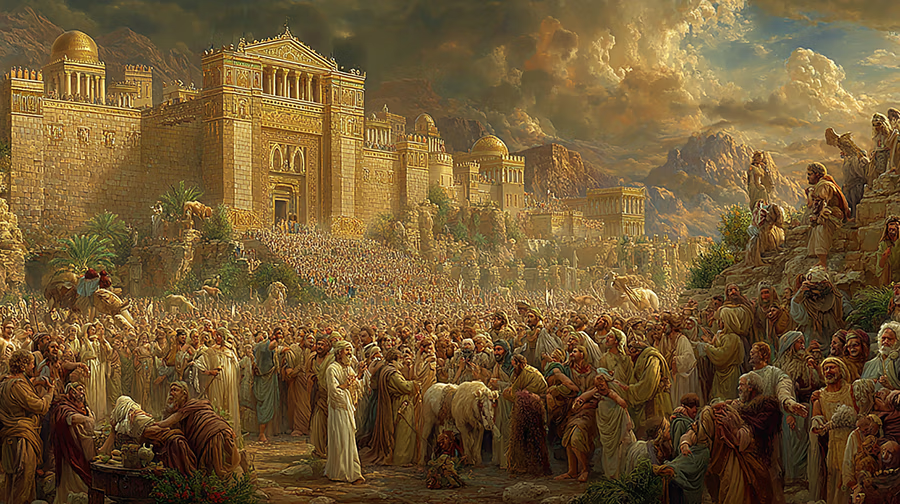
The King’s Hope and God’s Character
The king of Nineveh expresses humble uncertainty about God’s response, asking “Who can tell if God will turn and relent?” This demonstrates genuine faith without presumption. He recognizes God’s sovereignty while hoping in His mercy, showing that authentic repentance combines humble action with trust in divine compassion rather than demanding guaranteed outcomes.
Who can tell if God will turn and relent, and turn away from His fierce anger, so that we may not perish? (Jonah 3:9 NKJV)
The king’s question reveals remarkable theological insight. He does not presume upon God’s mercy or demand a specific response. Instead, he places the city’s hope in the possibility of divine compassion while acknowledging God’s absolute right to execute judgment. This balance between hope and humility characterizes mature faith that recognizes we cannot manipulate God through religious performance while still trusting in His merciful nature.
The phrase “who can tell” echoes similar expressions found throughout Scripture when people faced God’s judgment. King David used comparable language in 2 Samuel 12:22 when fasting for his dying child: “Who can tell whether the Lord will be gracious to me, that the child may live?” Joel 2:14 poses an almost identical question during a locust plague: “Who knows if He will turn and relent?” These parallel passages suggest a common understanding among biblical figures that genuine repentance offers hope without guaranteeing specific outcomes.
The king’s reference to God’s “fierce anger” acknowledges the just cause for divine wrath. The Ninevites did not attempt to minimize their guilt or argue that they deserved better treatment. They simply threw themselves on the mercy of a God they barely knew, trusting that His character might include compassion alongside His holiness. This willingness to approach God based on hope rather than entitlement provides a model for all who seek reconciliation with their Creator.
When we apply these principles through the lens of teaching on Christian faith and contemporary challenges, we discover that modern culture often inverts this relationship. Many approach God with demands, expecting Him to conform to their preferences rather than submitting to His sovereign will. The king of Nineveh demonstrates an alternative posture—one of humble petition without presumption, earnest seeking without entitled expectation.
God’s Compassionate Response
God responds to Nineveh’s genuine repentance by relenting from the disaster He had planned. This divine response demonstrates that God’s warnings carry inherent calls to repentance and that His ultimate desire is restoration rather than destruction. His willingness to change course based on human response reveals both His sovereignty and His responsiveness to sincere repentance.
Then God saw their works, that they turned from their evil way; and God relented from the disaster that He had said He would bring upon them, and He did not do it. (Jonah 3:10 NKJV)
The text specifies that God “saw their works”—not merely their words or religious rituals. Authentic repentance produces visible change in behavior and lifestyle. The Ninevites did not simply feel sorry about their violence; they “turned from their evil way.” This combination of internal transformation and external demonstration satisfies the biblical standard for genuine repentance found throughout Scripture.
God’s decision to relent raises important theological questions about divine immutability and foreknowledge. How can an unchanging God change His plans? The resolution lies in understanding that God’s character remains constant while His actions respond to human choices within His sovereign purposes. His “relenting” does not indicate fickleness or uncertainty but demonstrates His consistent commitment to mercy when people genuinely repent. God’s warnings always contain implicit invitations to change, and His judgments remain suspended when that change occurs.
This principle appears throughout Scripture. In Jeremiah 18:7-10, God explicitly states this pattern: “The instant I speak concerning a nation and concerning a kingdom, to pluck up, to pull down, and to destroy it, if that nation against whom I have spoken turns from its evil, I will relent of the disaster that I thought to bring upon it.” The Book of Jonah 3 provides a concrete historical example of this divine principle in action.
The Ninevites’ reprieve also reveals God’s heart for all nations, not merely Israel. This universality of divine mercy challenges the exclusivist thinking that dominated much of Israel’s history and continues to plague religious communities today. God’s concern extends to the “great city” of Nineveh with its 600,000 residents, demonstrating that geographic boundaries, ethnic identities, and political affiliations do not limit His redemptive purposes.
For believers today wrestling with questions about who deserves God’s grace, Nineveh stands as a definitive answer. If God extends mercy to the brutal Assyrians based solely on their repentance, then no person or people group falls outside the reach of divine compassion. As we consider applications from biblical principles for modern believers, we must confront our own Jonah-like prejudices that would limit God’s grace to those we deem worthy.
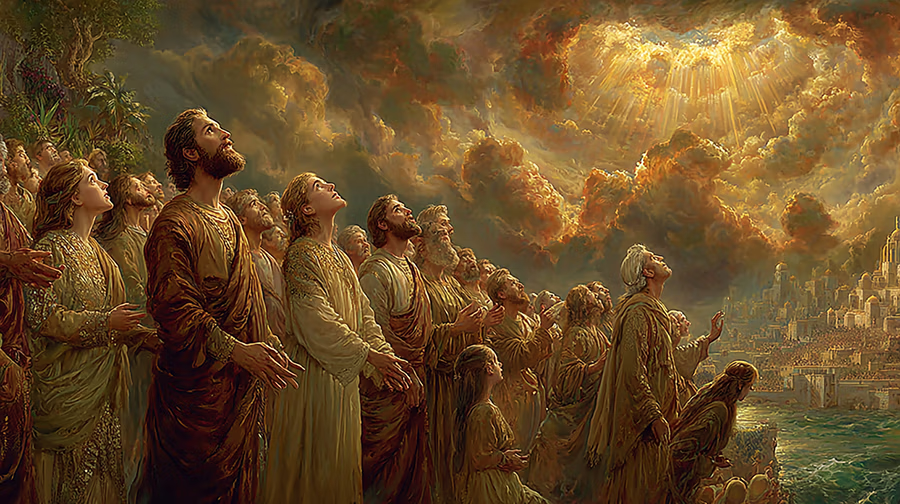
The Sign That Validated Jonah’s Message
Jonah’s physical appearance after three days in the fish served as a miraculous sign validating his message. The Ninevites, who worshiped the fish god Dagon, would have recognized Jonah’s survival as a divine intervention. This sign, combined with his prophetic word, created conditions for the Holy Spirit to bring conviction and repentance to an entire city.
The Book of Jonah 3 gains additional depth when we consider the sign factor in Jonah’s mission. Jesus Himself referenced this account in Matthew 12:39-41, calling Jonah’s experience “the sign of the prophet Jonah” and declaring that “the men of Nineveh will rise up in the judgment with this generation and condemn it, because they repented at the preaching of Jonah; and indeed a greater than Jonah is here.”
Jonah’s physical condition after emerging from the fish served as a living testimony to God’s power. In a city that worshiped Dagon, the fish god, the appearance of a man who had survived three days inside a great fish carried enormous significance. The Ninevites would have heard reports of this event through their maritime trade networks. Phoenician sailors who witnessed Jonah’s ordeal and subsequent vomiting onto the shore would have shared the incredible story throughout port cities.
When Jonah walked through Nineveh’s streets before delivering his message, he allowed people to see him. His appearance would have been unmistakable: discolored or bleached skin from digestive acids, possible tooth marks, complete hair loss, and the general appearance of someone who had died and returned to life. This visual testimony preceded and validated his prophetic word.
The strategic importance of this sign should not be underestimated. Jonah did not need to convince the Ninevites of God’s existence or power. The evidence walked before them. All he needed to do was deliver God’s message of impending judgment. The sign created receptive hearts; the message directed those hearts toward repentance. This pattern of divine validation followed by prophetic proclamation appears repeatedly throughout Scripture, most profoundly in Jesus Christ Himself, whose miracles validated His message about the kingdom of God. Similar patterns of God’s redemptive work can be seen in our studies of God’s providence in the Book of Ruth and divine guidance in the Book of Esther.
For contemporary witnesses, Jonah’s example suggests that transformed lives often speak louder than eloquent arguments. When we explore the deeper aspects of developing authentic faith in daily life, we discover that personal testimony of God’s redemptive work carries unique persuasive power. People may debate theology, but they cannot easily dismiss the evidence of changed lives.

Jonah’s Ongoing Struggle with God’s Mercy
The chapter ends with God’s merciful response to Nineveh’s repentance, but the larger narrative of Jonah continues. Chapter 4 will reveal Jonah’s angry response to God’s compassion—a response that exposes the depth of his prejudice and the distance between his perspective and God’s heart. Even after obediently delivering the message, Jonah hoped for Nineveh’s destruction rather than their salvation.
This uncomfortable reality reminds us that external obedience does not automatically transform internal attitudes. Jonah went to Nineveh, but his heart remained resistant to God’s purposes. He fulfilled his prophetic duty while nursing resentment toward both God’s mercy and its recipients. This disconnect between action and attitude challenges every believer to examine not only our compliance with God’s commands but also our embrace of His character and values.
The Book of Jonah 3 forces us to confront difficult questions: Do we rejoice when our enemies repent, or do we secretly wish for their judgment? Do we extend grace freely, or do we ration it based on our assessment of who deserves it? Do we share God’s passion for the redemption of all people, or do we harbor prejudices that limit our evangelistic vision?
These questions remain painfully relevant in contemporary contexts marked by political polarization, racial tensions, and religious conflicts. Like Jonah, we may find ourselves hoping that God will judge those who have harmed us or our communities rather than extending them opportunities for repentance and restoration. The temptation to view certain groups as beyond redemption or unworthy of our evangelistic efforts reflects the same narrow nationalism and ethnic pride that motivated Jonah’s initial flight from God’s call.
Practical Applications for Contemporary Believers
The Book of Jonah 3 teaches modern believers about second chances, the power of simple obedience, comprehensive repentance, and God’s universal mercy. It challenges us to examine our prejudices, trust God’s heart for all people, respond quickly to His conviction, and lead others toward genuine repentance through both word and example.
The account of Nineveh’s repentance provides rich instruction for twenty-first century Christians seeking to live faithfully in an increasingly complex world:
God Offers Second Chances: Jonah’s recommissioning demonstrates that God does not discard His servants after failure. No matter how far we have run or how badly we have failed, God’s purposes for our lives remain intact. This encouragement does not minimize the consequences of disobedience—Jonah’s ordeal in the fish was real and traumatic. But it affirms that God’s grace extends beyond our mistakes and His calling survives our rebellion.
Obedience Matters More Than Enthusiasm: Jonah obeyed without joy, motivated more by lessons learned through suffering than by wholehearted agreement with God’s purposes. Yet God used his reluctant obedience to accomplish remarkable results. This reality encourages believers who struggle to find emotional connection to God’s commands. Sometimes faithfulness looks like determined compliance even when our hearts lag behind our actions.
Genuine Repentance Produces Visible Change: The Ninevites did not merely express remorse or perform religious rituals. They fundamentally altered their behavior, turning from violence and injustice. This transformation from evil actions to righteous conduct defines authentic repentance. Contemporary calls to repentance that demand only verbal acknowledgment without lifestyle change fall short of the biblical standard demonstrated in Nineveh.
Leadership Sets the Tone for Repentance: The king of Nineveh’s personal humility and decisive action enabled city-wide transformation. Leaders who model repentance and humility before God create environments where others feel safe to acknowledge their own need for divine mercy. Whether in families, churches, businesses, or governments, the quality of leadership significantly impacts the spiritual climate of communities.
God’s Mercy Extends Beyond Our Comfort Zones: Nineveh’s salvation challenged everything Jonah believed about God’s priorities and purposes. Similarly, contemporary believers must wrestle with the implications of divine mercy that extends to people we consider enemies or beyond redemption. God’s love for all humanity requires us to expand our evangelistic vision beyond our natural affinities and comfortable relationships.
Quick Response to God’s Conviction Yields Better Outcomes: The Ninevites did not delay or debate Jonah’s message. They responded immediately and comprehensively. This urgency contrasts sharply with modern tendencies to rationalize sin, delay repentance, or negotiate with God’s standards. The Book of Jonah 3 models swift, decisive response to divine conviction without procrastination or partial compliance.
Theological Significance for Understanding God’s Character
The third chapter of Jonah reveals aspects of God’s character that challenge simplistic or one-dimensional understandings of divine justice and mercy. God appears simultaneously as the judge who pronounces sentence and the redeemer who delights in showing compassion. He upholds His holiness by identifying and condemning evil while demonstrating His mercy by responding to genuine repentance.
This tension between justice and mercy finds its ultimate resolution in the cross of Jesus Christ. The God who relented from destroying Nineveh would not relent from pouring out judgment when His own Son bore the sins of the world. The mercy shown to repentant Ninevites was purchased at infinite cost, though that cost would not be paid for centuries after Jonah’s mission. Every instance of divine forbearance throughout the Old Testament pointed forward to the definitive act of redemptive judgment accomplished at Calvary.
The Book of Jonah 3 also reveals God’s persistent pursuit of the lost. He did not abandon His plan to warn Nineveh when His first messenger fled. He prepared Jonah through discipline, recommissioned him for service, and empowered his message to produce extraordinary results. This divine persistence reflects the character of the shepherd who leaves ninety-nine sheep to seek the one that is lost, the woman who searches diligently for a single lost coin, and the father who watches hopefully for his prodigal son’s return.
God’s concern for Nineveh’s 600,000 residents foreshadows the Great Commission that would eventually send believers to “all nations.” The Book of Jonah stands as an Old Testament preview of New Testament truth: God so loved the world that He gave His only Son, that whoever believes in Him should not perish but have everlasting life. The “whoever” includes Assyrians and Israelites, pagans and prophets, the violent and the victim.
Connecting Jonah’s Message to Constitutional Principles
The mission of Trust and Obey with Chuck Frank emphasizes that a constitutional republic can only survive and thrive with a believing populace. The Book of Jonah 3 illustrates this truth from an unexpected angle. When an entire city turns from violence and injustice to seek God’s mercy, the transformation affects not only individual souls but also the social fabric and governing structures of that community.
Nineveh’s reprieve from judgment came through comprehensive repentance that began with the king and extended through every level of society. This top-to-bottom transformation created conditions for peace and justice that would not have been possible under their previous system of systematic cruelty. The story demonstrates that genuine spiritual renewal produces social benefits and that moral reformation provides the foundation for stable governance.
The American founders understood this principle. When Benjamin Franklin called for prayer during the Constitutional Convention’s most difficult impasse, he recognized that human wisdom alone could not forge a lasting system of government. The prayer that opened this study of the Book of Jonah 3 captures Franklin’s understanding that divine guidance and moral foundation prove essential for political success.
Modern applications of this principle challenge both religious and secular communities. Religious believers must resist the temptation to impose external morality without calling for heart transformation. Secular leaders must acknowledge that laws and institutions rest upon moral foundations that ultimately derive from transcendent sources. Nineveh’s transformation came not through new legislation but through changed hearts that produced changed behavior.
As our nation faces increasing polarization, violence, and injustice, the Book of Jonah 3 offers a path forward. Comprehensive repentance that begins with leaders and extends through all levels of society creates conditions for divine blessing and national healing. This hope does not depend on partisan political victories but on genuine spiritual renewal that transforms hearts, families, churches, and communities.
Personal Reflection and Response
The third chapter of Jonah concludes with divine mercy extended and disaster averted. But the larger story continues, and so does our own journey with God. Each reader must determine how to respond to the truths revealed in this remarkable narrative.
Consider these questions for personal reflection:
Is there a “Nineveh” in your life—a person, group, or situation where you have given up hope for redemption? Has God called you to extend His message to someone you consider beyond reach or unworthy of grace?
How quickly do you respond when the Holy Spirit convicts you of sin or calls you to action? Do you rationalize, delay, or negotiate with God’s clear direction?
Does your obedience to God’s commands flow from wholehearted agreement with His purposes, or are you, like Jonah, complying reluctantly while harboring resentment?
When you see God’s grace extended to people you consider enemies or less deserving than yourself, does your heart rejoice or bristle?
Are there areas of your life where you have substituted religious activity for genuine repentance—performing rituals without producing the fruit of changed behavior?
The Book of Jonah 3 calls us to examine not only our actions but our hearts, not only our obedience but our attitudes. It challenges us to align our values with God’s heart for all people and to participate joyfully in His redemptive purposes even when those purposes extend grace beyond our comfort zones.
As you reflect on these themes, remember that the same God who gave Jonah a second chance offers new beginnings to all who turn to Him. The same divine mercy that spared Nineveh remains available to every person, community, and nation that responds to His call for repentance. And the same transforming power that changed an entire city can change individual lives, families, churches, and societies today.
The message remains simple: turn from evil, cry out to God, and trust in His mercy. The response required remains comprehensive: genuine repentance that produces visible change in behavior and values. And the hope offered remains glorious: a God who delights to show compassion and whose mercy triumphs over judgment.
Frequently Asked Questions (FAQs)
Why did God give Jonah a second chance after his disobedience?
God’s second commissioning of Jonah demonstrates His commitment to both His purposes and His servants. Despite Jonah’s rebellion, God did not abandon either His plan to warn Nineveh or His chosen messenger. This reflects the consistent biblical pattern that God’s calling and gifts are irrevocable (Romans 11:29) and that His grace extends beyond our failures when we return to Him in humility.
How did the Ninevites know to fast and wear sackcloth if they were pagans?
The Ninevites likely learned these Jewish penitential practices through multiple channels: captured Israelites living in Assyria, trade relationships with Hebrew merchants, or direct divine revelation. Their immediate adoption of these practices demonstrates both the Holy Spirit’s convicting work and their willingness to humble themselves completely before Jonah’s God, even adopting unfamiliar religious customs to express their repentance.
Did the Ninevites’ repentance last, or did they return to their evil ways?
Historical evidence suggests that Nineveh’s repentance, while genuine in the moment, did not produce lasting transformation. Later biblical prophets, particularly Nahum, pronounced judgment on Nineveh for their return to violence and wickedness. This reminds us that genuine repentance requires ongoing commitment, not just momentary crisis response. The Book of Jonah 3 records authentic repentance that brought temporary reprieve, but sustained spiritual transformation demands continued faithfulness.
What does it mean that God “relented” or “changed His mind” about destroying Nineveh?
God’s relenting does not indicate uncertainty or fickleness in His character. Rather, it demonstrates His consistent commitment to mercy when people genuinely repent. God’s warnings always contain implicit invitations to change, and His judgments remain conditional upon human response. His immutable nature includes being unchangingly merciful toward those who turn from evil, just as He is unchangingly just toward those who persist in rebellion (Jeremiah 18:7-10).
Further Reading
For deeper exploration of the themes in the Book of Jonah 3, consider these authoritative resources:
Biblical Commentaries:
- Jonah Commentary by Jay Sklar from The Gospel Coalition provides scholarly yet accessible analysis of the book’s historical context, theological themes, and literary structure
- Enduring Word Bible Commentary on Jonah by David Guzik offers verse-by-verse exposition with practical applications for contemporary believers
Historical and Archaeological Resources:
- The Ancient Assyrian Empire offers comprehensive information about Nineveh’s historical significance and Assyrian culture
- Archaeological Discoveries at Nineveh documents excavations at the ancient site and artifacts from the period
Theological Studies:
- Divine Repentance in the Old Testament examines the theological implications of God’s relenting in response to human repentance
- Jonah and the Missionary Heart of God explores how Jonah foreshadows the Great Commission and God’s universal salvific will
Ministry Application:
- Lessons from Nineveh for Modern Evangelism applies principles from Jonah’s mission to contemporary witnessing strategies
- Repentance and Revival in Scripture traces biblical patterns of corporate repentance and spiritual renewal

